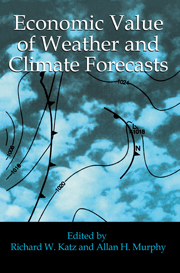4 - Forecast value: prescriptive decision studies
Published online by Cambridge University Press: 27 October 2009
Summary
Introduction
Many human activities and enterprises are affected by uncontrollable future weather conditions. The outcomes of numerous decisions, ranging from fairly trivial (such as opening a window or carrying an umbrella) to vitally important (substantially affecting the livelihoods of one or more individuals or firms), are therefore dependent on these same uncontrollable conditions. It is natural that individuals will seek out information about the future to help make better decisions. That there is substantial interest in, and demand for, weather forecasts indicates that people, at least informally, realize that weather forecasts can be valuable in decision making.
The quality of weather forecasts has gradually improved through time as fundamental knowledge and operational experience has accumulated (e.g., Caplan and White, 1989; Carter, Dallavalle, and Glahn, 1989). Yet it is clear from either informal exposure to weather forecasts, by comparing the local forecast to the ensuing weather in that region or from formal study of the performance of weather forecasts (see Chapter 2 in this volume), that a completely accurate specification of future weather is not possible. There are fundamental physical reasons for this situation, which are described in some detail in Chapter 1. Their implication is that even short-range weather forecasts will never achieve perfection, and that monthly or seasonal forecasts will always be subject to considerable uncertainty. Thus while forecasts can and do reduce the uncertainty associated with future weather events, individuals facing decisions whose consequences will be influenced by these events are now and will always be in a position of uncertainty.
- Type
- Chapter
- Information
- Economic Value of Weather and Climate Forecasts , pp. 109 - 146Publisher: Cambridge University PressPrint publication year: 1997
- 28
- Cited by



